Jul
18
2014
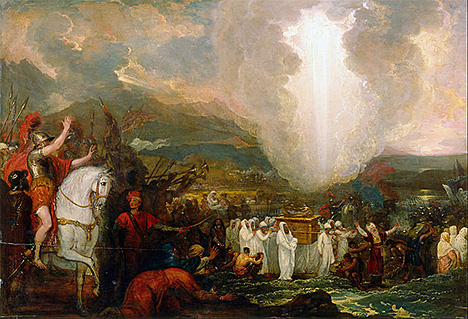
At that time the Lord said to Joshua,
“Make flint knives and circumcise
the sons of Israel a second time.”
(Joshua 5:2)
Was Israel disobedient in its failure to circumcise every male born in the wilderness? The Lord never chastised them for this. If this lapse in the practice of circumcision was in the plan of God, what was the purpose of that plan? The example which first comes to mind is the circumcision of the firstborn son of Moses in Exodus 4:24-26.
This post has been slain and resurrected for inclusion in my 2015 book of essays, Inquietude.
Continue reading
Comments Off | tags: Circumcision, Covenant Theology, Egypt, Exodus, Firstfruits, James B. Jordan, Jericho, Moses, Revelation, Sodom | posted in Bible Matrix, Biblical Theology, The Last Days, The Restoration Era
Apr
12
2012
or The Liturgical Significance of Lot
 Part 1, The Architectural Significance of Lot’s Daughters, is here.
Part 1, The Architectural Significance of Lot’s Daughters, is here.
We’ve looked at the three-level Tabernacle structure in Genesis 19. That’s the rooms, and their doors, so what about the furniture?
The events follow the Bible Matrix, so an identification of how each step in the story fulfills the Creation Week might shed some light on the point of the details that the Spirit has included for us. And identifying how each step fulfills the Festal Calendar might also shed some light on the motivations of Lot and his daughters. The prefigurements of events nearly half a millennium in their future are breathtaking.
Continue reading
1 comment | tags: Abraham, AD70, Altar of the Abyss, Covenant curse, Feasts, Genesis, Literary Structure, Revelation, Sodom, Systematic typology, Tabernacle | posted in Bible Matrix, Biblical Theology, The Last Days
Apr
9
2012
or The Architectural Significance of Lot’s Daughters
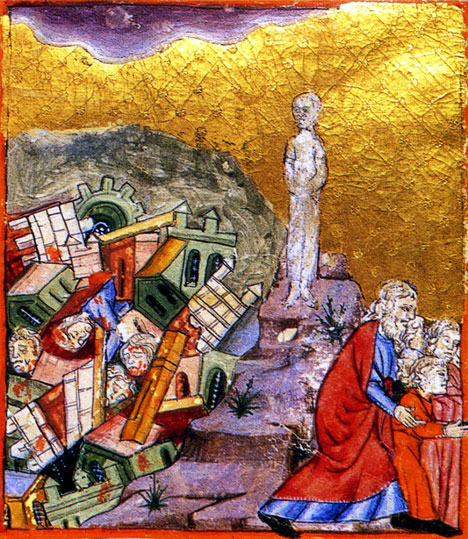
“His eyes [were] like a flame of fire …
[and] out of His mouth went a sharp two-edged sword”
(Revelation 1:14-16)
“I will set My face against you,
and you shall be defeated by your enemies.”
(Leviticus 26:17)
The Tabernacle layout to the Bible narratives is like the Globe Theatre to Shakespeare. [1] If we understand the correspondences we can get the “architectural” relationships worked out. The same blueprint appears again and again, and it explains the motivation of “righteous Lot” in the offering of his daughters to the men of Sodom. Continue reading
1 comment | tags: Abraham, Altar of the Abyss, Genesis, Lot, Sodom, Systematic typology, Tabernacle, Ten Commandments | posted in Biblical Theology, The Last Days
Dec
1
2010
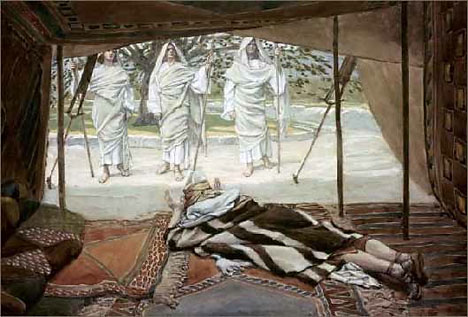
“…of the angels He says:
‘Who makes His angels spirits
and His ministers a flame of fire.’”
God is the source of all things, and He identifies Himself as such in His speeches. Every speech is Covenantal, and every preamble within His speeches is a statement of transcendence. “I am the Lord your God.”
After the initial call comes delegation, Covenantal Hierarchy. A man, a Moses, an Abraham, receives the Word with meekness.
We know that angels are God’s messengers, the sent ones. They administered the Old Covenant as our tutors, Satan becoming the first false teacher, the first corrupt ambassador, or, if you will, the first publican.
[This post has been refined and included in Sweet Counsel: Essays to Brighten the Eyes.]
Continue reading
5 comments | tags: Abraham, Angels, Covenant Theology, Creation Week, Daniel, Genesis, Judges, Leviticus, Nazirite, Nebuchadnezzar, Resurrection, Revelation, Samson, Sodom | posted in Bible Matrix, Biblical Theology, The Last Days
Aug
31
2010
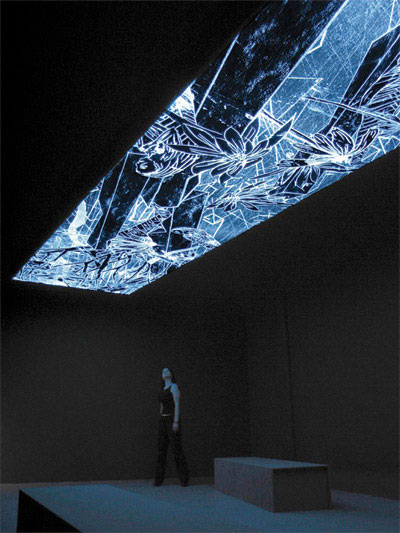
From James B. Jordan’s Trees and Thorns: [1]
The land and garden of Eden were watered by a spring. Why call attention to the fact that God did not send rain? Why not just mention the spring and leave off the statement about rain? The reason, I believe, is to call our minds back to Genesis 1:2-9. We find in Genesis 1:2 that there was an ocean over the original earth. Then God created the firmament, and separated the waters above from the waters below. On the third day God gathered the waters below into areas below the surface of the land.
Now we have a clear distinction between waters above the firmament, the source of rain, and waters below, which would have to come up from under the earth. Both Genesis 1:2-9 and 2:5-6 set up the distinction eschatologically; ground water comes first, and then heavenly water.
Continue reading
Comments Off | tags: Egypt, Genesis, James Jordan, Moses, Sodom | posted in Biblical Theology, Creation, Quotes
Nov
16
2009
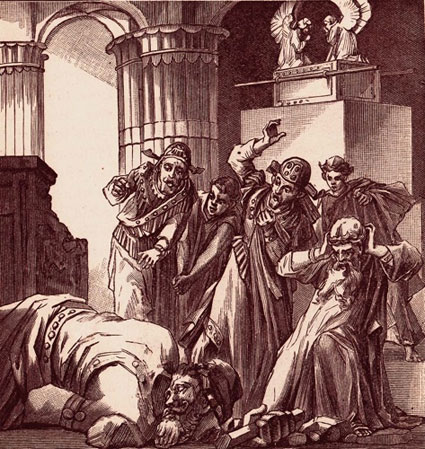
“The LORD will strike you with the boils of Egypt, with tumors, with the scab, and with the itch, from which you cannot be healed.” Deuteronomy 28:27
The Bible matrix pattern brings out some interesting parallels. Step 5 is about a military multitude in unity after being tested under the Law of God. It is Deuteronomy. It is Trumpets. It is the swarms of fish and birds on Day 5. It is the step of plagues and plunder. It is the step where Jesus tells His disciples they will now need both swords and moneybags.
Continue reading
Comments Off | tags: Ark of the Covenant, Bible Matrix, Egypt, Eli, Herod, Sodom | posted in Biblical Theology, The Last Days
Nov
3
2009
or Every Knee Shall Bow
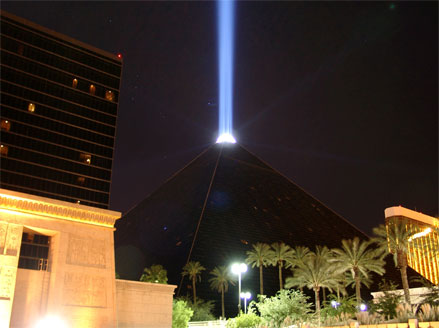
Day 1
So, Adam fouled the first Sabbath. He failed to be Light.
Day 2
Cain made a false exodus (with Abel as the Passover lamb) and went to “worship in the wilderness.” God marked him as a “covering.” Being “barren”, Cain built a city as a covering, but it was just like Adam’s figleaves. It was a phony firmament, a fabricated Covenant, a city built on the wrong sort of blood.
Day 3
His offspring built a counterfeit Tabernacle – in opposition to the worship at the Gate of Eden. This was a false Land, a false mountain, like Mount Gerizim became to the Samaritans. Lamech, as a false Moses, “ascended” not as a Lamb slain, but as an accuser, the incarnation of the serpent. But someone true ascended as Firstfruits: Enoch.
This brings us to Day 4. As in the Garden, and as in Israel’s wilderness, the test was harlotry.
Continue reading
Comments Off | tags: Abel, Babylon, Cain, Egypt, Enoch, Genesis, Herod, Incense Altar, Lamech, Noah, Satan, Seth, Sodom | posted in Biblical Theology, The Last Days
Jun
30
2009
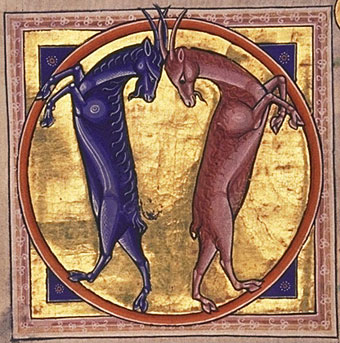 “And their dead bodies will lie in the street of the great city which spiritually is called Sodom and Egypt, where also our Lord was crucified.” – Revelation 11:8
“And their dead bodies will lie in the street of the great city which spiritually is called Sodom and Egypt, where also our Lord was crucified.” – Revelation 11:8
Revelation 20 makes it clear that the “second death” is the lake of fire. But an analysis of the literary structure of Revelation brings out an interesting factor.
Continue reading
Comments Off | tags: Against Hyperpreterism, Armageddon, Atonement, Azal, Egypt, Feasts, James Jordan, Passover, Peter Leithart, Revelation 20, Smyrna, Sodom, Systematic typology, Tabernacle | posted in Biblical Theology, The Last Days, Totus Christus
May
1
2009
“I pray for them. I do not pray for the world but for those whom You have given Me, for they are Yours. And all Mine are Yours, and Yours are Mine, and I am glorified in them.”
Jesus prayed these words shortly before these disciples betrayed, deserted and denied Him. As High Priest, the twelve were still just names etched on His shoulders. Unformed and uninteresting.
After Pentecost, with God’s breath breathed into them, each would become a precious stone, differing in glory from the others. They would be fully formed elders surrounding the slain Lamb (Rev. 5:6), walls and gates of a new Jerusalem.
With the seven eyes of the High Priest, the light of the Lampstand flames, Jesus could already see Pentecost, when the disciples would become the ‘angelic glories’ sent to warn Herod’s Sodom (Rev. 11:8) and curse it with blindness. Old Jerusalem was sulphur in God’s nostrils, but the apostles became an incense altar of aromatic smoke.
The twelve spoke words that changed the whole world in a matter of decades. Jesus sees us with those same eyes. We deny Him. We betray Him. We desert Him. But we are His, and He sees our future. Breathe into us, breath of God.
Comments Off | tags: Gethsemane, Herod, High Priest, Pentecost, Sodom | posted in Biblical Theology, The Last Days
Apr
15
2009
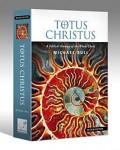
The one who conquers and who keeps my works until the end, to him I will give authority over the nations, and he will rule them with a rod of iron, as when earthen pots are broken in pieces, even as I myself have received authority from my Father.
Christ refers here to Psalm 2. It had been fulfilled in the “head” at His ascension. At this point, it was yet to be fulfilled in the “body.”
Continue reading
Comments Off | tags: Acts, Angels, Ascension, Peter Leithart, Psalm 2, Sodom, Totus Christus, Two witnesses | posted in Biblical Theology, Totus Christus


































